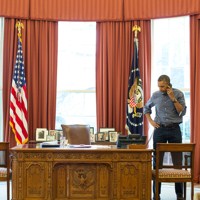The Ukraine crisis has once again highlighted a fundamental weakness of the U.S. national security process: its inability to hold to long-term planning in the midst of short-term crises. The entire Crimea imbroglio has been a gift to China’s leaders, further delaying the vaunted U.S. “rebalance” toward Asia. At the beginning of 2014, with war over the use of WMDs in Syria off the table, the prospects for a long-term troop presence in Afghanistan looking dim and a settlement with Iran over its nuclear program possibly within reach, it seemed that, at long last, Washington might finally begin to match action to rhetoric and concentrate on the Asia-Pacific region. Now, the talk in U.S. foreign policy circles is all about a “pivot” back to Europe, the return of Russia as America’s “No. 1” geopolitical foe and the need to gear up to confront Moscow along the Eurasian plains.
An added benefit for Beijing is that continued Western pressure will drive Moscow closer into China’s embrace—guaranteeing once and for all that the Middle Kingdom will not be encircled on its vulnerable northern and western frontiers and ensuring that more of Russia’s natural resource endowment will be redirected from Europe to China.
Because of the crisis-driven nature of the U.S. national security system, when a new emergency erupts, the whole of government pivots to chase the ball down the field—everyone wants a piece of the action—and other issues get put on standby. We have seen, for instance, how, as the events in Ukraine consumed the policy oxygen in Washington, Venezuelan President Nicolas Maduro has taken the opportunity to accelerate the repression of his country’s political opposition and to further solidify his hold on power. Add to this the budget constraints on U.S. action—particularly the abandonment of the construct that the United States should be able to handle two regional crises in different parts of the world simultaneously—and gaps will start to open.

